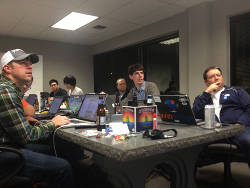About Document Freedom Day
🗓 Wednesday, March 26th 2025
Document Freedom Day is the international day of Open Standards
and happens every year on the last Wednesday of March.
It is a day to come together and raise attention
towards the ever-growing importance of Open Standards
for all aspects of our digital communication
and information accessibility.
About Document Freedom Day
... people come together and inform themselves about the ever-growing importance of Open Standards.

With the rise of new technologies and hardware, more and more communication is transmitted via electronic data. At the same time, more and more information is provided in digital formats or even created in digital format and will never be transferred to any analogue media. Various stakeholders try to exploit these factors by offering communication or information services that use proprietary data formats to lock users into their software, hardware and services. But we do not have to go on like they want us to do. We can get rid of restrictions and vendor lock-ins if we keep on using Open Standards. These are data formats that can be freely implemented in any service, hardware or software. Use Document Freedom Day to
Get involved and spread the word Join an event close to you
DFD is all about compatibility

Remember when you were sent an important file that your computer couldn't read properly? Remember having to buy or download a new application just so you could open an attachment that you needed for work? The same thing happens tens of thousands of times each day. Can you imagine how much knowledge exchange doesn’t happen just because sender and receiver (intentionally or not) are using different data formats? Incompatibilities like this are usually caused by ways of storing information that are secret ('closed'), and privately owned ('proprietary'). They cause huge problems for people, companies, and governments, and cost society an awful lot in creativity, productivity, and efficiency. Incompatible standards are used to manipulate markets and allow companies to charge people huge fees simply for the privilege of accessing their own data. Closed standards are also the basis of the world's worst technology monopolies. Can you imagine how much knowledge future generations will lose if we keep on using proprietary, closed data formats that one day no one will ever be able to open because the company behind it had business secrets and patents on it but then went bankrupt? Or the company behind decides to switch to a new format and to not support or implement the older one anymore? That's why Open Standards are so important. Only openly implementable, usable and documented standards can guarantee their compatibility throughout any software on any devices today and in the future. Data formats and standards should be open during transmission as well as storage, including interfaces and protocols.
Document Freedom is more than documents
Document Freedom addresses much more than just essays and spreadsheets, it is about control of any kind of digital data - including artwork, sheet and recorded music, emails, and statistics. These can be stored in ways which empower users, but they can also be stored in formats which constrain and manipulate us at enormous cost. Documents that aren't free are locked to some particular software or company. The author cannot choose how to use them because they are controlled by technical restrictions. Just like a powerful car that is artificially restricted to 30 km/h.

Open Standards, instead, are formats and protocols which everybody can use free of charge and restriction. They come with compatibility "built-in" - the way they work is shared publicly, and any organization can use them in their products and services without asking for permission. Open Standards are the foundation of cooperation and modern society: train tracks, power sockets, and natural language are all examples of specifications that we all rely on and take for granted. Imagine if speaking English required permission and a license fee - society would be backward and chaotic. Hence, documents that are free can be used in any way that the author intends and without restrictions. They can be read, transmitted, edited, and transformed using a variety of tools. Read more about Open Standards and what defines them.
